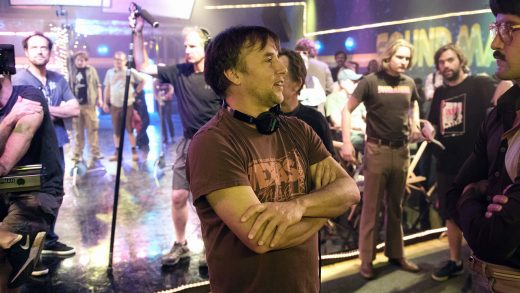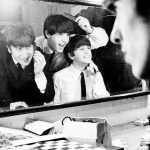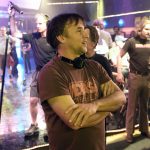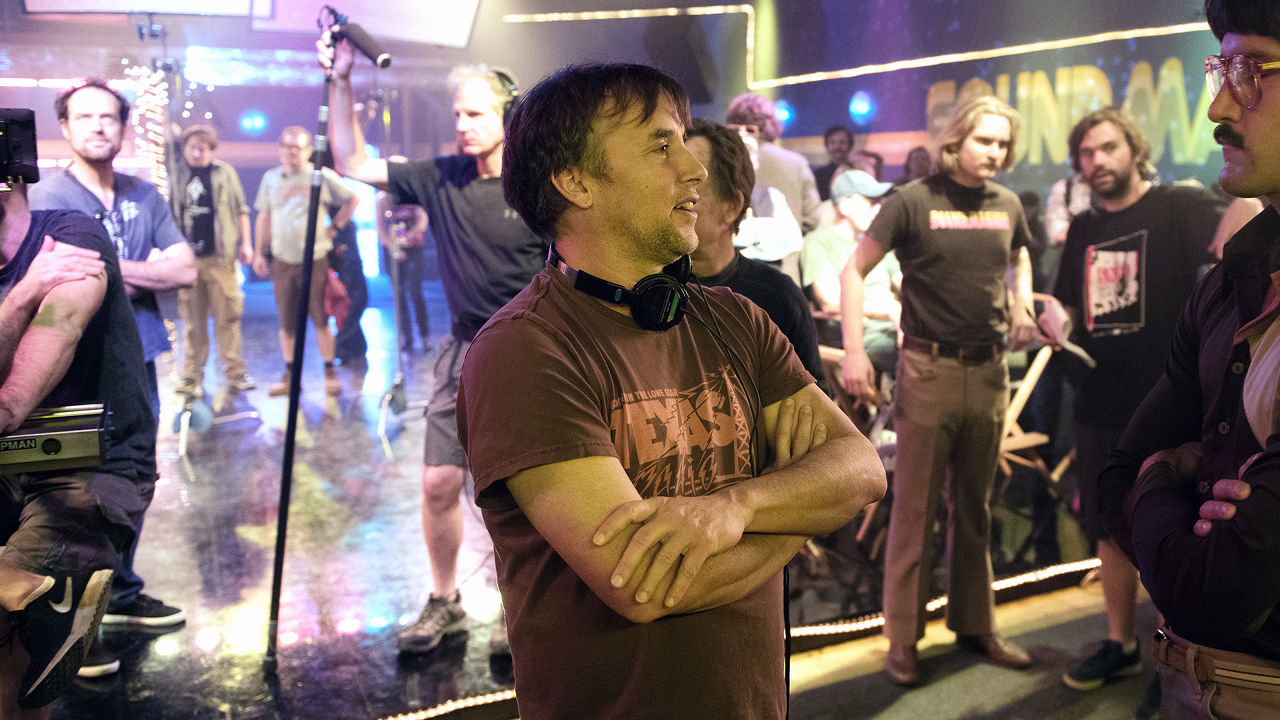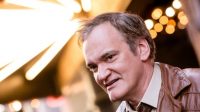Richard Linklater On How The Story Is Always In the Details
Richard Linklater is often a man out of time. Whether it’s returning to suburban 1976 in his resin-caked breakthrough, Dazed and Confused, riding around in Model Ts for the 1920s-set Newton Boys, or visiting the near future in the rotoscoped paranoid fantasy, A Scanner Darkly, he’s at home in any era. Clearly, something about bringing a time period to life helps him bring a story to life.
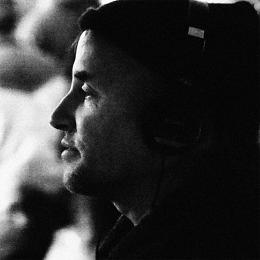
In his last film, 2014’s coming-of-age magnum opus, Boyhood, he had it easy. All Linklater had to do to take a broad-canvas snapshot of each of the 12 years the movie was filmed during was take a look outside and breathe it all in. The singular process of putting Boyhood together afforded him the opportunity to make a period piece in real time. While iPhones and YouTube are invented in the background, people grow apart or come together in the foreground. It was an intimate, meaningful experiment that pushed the boundaries of filmmaking forward. For his next project, however, Linklater wanted to go back—in a few different ways. Everybody Wants Some!! is set in 1980, borrows heavily from his own life, and is a throwback to the ensemble, day-in-the-life, laid back comedy of Dazed and Confused.
Now playing in theaters, Everybody Wants Some!! is set during the weekend before college starts for baseball player and Linklater surrogate, Jake (Blake Jenner). The movie follows Jake around as he learns the hierarchy of being on a high-caliber baseball team, and as he and the team wander from discotheque to country bar and experience some of the many ways students in 1980 lived life. Oh yeah, they also try to get laid. A lot. The film’s title is very apt.
While the time period itself is merely a vehicle for the story to drive in, some aspects of assembling that vehicle affect how it’s going to handle. Recently, Co.Create talked to Richard Linklater about watching old videos of American Bandstand for fashion cues, why it’s important to get the dancing right, and how certain details that seem charmingly old-fashioned are just the way things were.
Presenting The Times Without Winking At The Audience
“I didn’t want to have the players or anyone in the movie seem aware that they’re in a period piece, but I also wanted to have it be authentic as possible and try to get all the details right,” Linklater says. “[About a scene in which characters drive around singing along to “Rapper’s Delight”] I remember doing that. I remember being in the backseat with my friend Julio and he took the mic and replaced the name of the guy in the song with ‘Julio.’ That song’s such a watershed song, it’s been parodied and used in a lot of ways, but I was kind of going back to the original use at the time—what it felt like at the time to have something so new right in front of you. It had these kind of disco-y beats and you were like, ‘Well, what is rap music?’ And I wanted the characters to be open to that.”
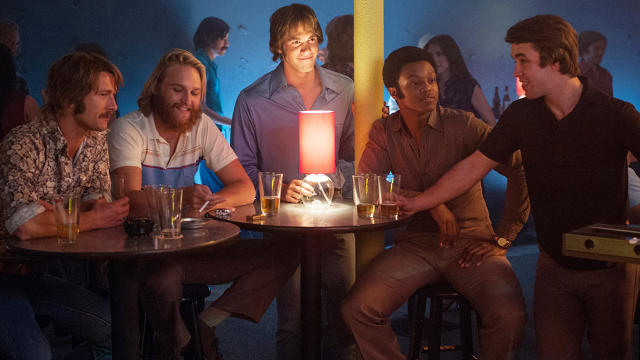
Watch What People Are Talking About
“The title at one point was gonna be That’s What I’m Talking About. I had one teammate, he would just say that for anything. You could say anything, and he’d be like, ‘That’s what I’m talking ’bout!’ He didn’t really make much sense. But it was something people said a lot back then,” Linklater says. “I was pretty careful about what people said and didn’t say in the movie. The stuff they’re talking about is mostly pretty general, it’s not so period specific. I wasn’t trying to draw any attention to topical stuff. On one hand, commenting on the world around them is going to change over time, because it’s a whole different world. Back then, there’d be one show that 89 million people would watch, so people all watched the same shows. On the other hand, people don’t change that much, kind of the same impulses raging through all of us.”
Getting The Cast On The Right Wavelength
“We were working all day and at night, we’d watch a movie. I was showing comedy and other films from ’79, ’80, that era. The pitch of the humor. I showed them Breaking Away, North Dallas 40. Because that’s the kind of stick-it-to-the-man athlete that at the time was taking on the power structure. It was kind of cool to be a cool athlete who didn’t kowtow to political opinions. I showed them a documentary about Doc Ellis called No No, which really showed baseball in the ’70s. What it felt like to be a kid growing up with that as the backdrop. These athletes who were kind of fun, and some of them were a little radical. I wanted the guys to have that in their head because that seems to have all but disappeared from the culture. The controversial athlete who says things that are challenging and not the status quo. There’s also a lot of mustache representation for that era, so what that becomes about is custom-making it for each cast member. ‘With your face, you would have a big mustache and, eh, you probably wouldn’t.’”
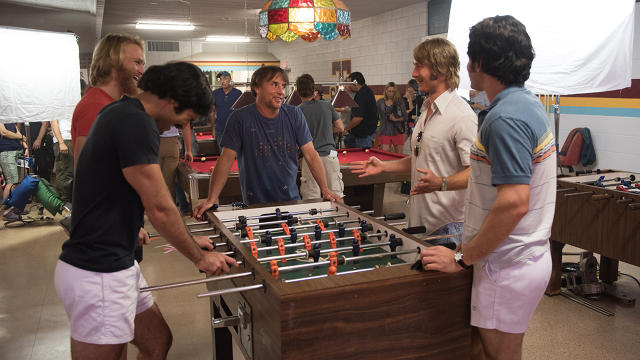
Things That Are Now Ironic Used To Be Done Sincerely
“It was fun working with the guys and seeing them get with the whole disco thing. I’d push them and explain, ‘This is a mating ritual, it’s foreplay. It’s like sex—get out there.’ That was the whole point. It was a pretty raunchy and uninhibited time,” Linklater says. “That seems so basic, so primordial, and yet people don’t really do that type of dancing any more, I don’t think. In retrospect, that dancing is funny. But at the time, it was what you’d do. And athletes weren’t afraid to dance. You’d get out there and move. I put it in the script. Unlike musicians, athletes can kind of dance. They’re not John Travolta on the dance floor, but they got some moves that worked for them.”
The Analog Era Affected People’s Actions
“I think people quickly forget how much time we used to spend lost or trying to connect—like, just going to pick somebody up from the airport. ‘I thought you were going to be at baggage?’ ‘No, I thought I told you I didn’t have a bag.’ ‘I was upstairs.’ ‘I was downstairs.’ ‘I left a message on your answering machine.’ We just spent so much time lost, and trying to connect. Misconnecting. You could call and the phone would just ring. And you could always lie, ‘I called you over the weekend and you didn’t answer.’ But at some point in the ’80s you couldn’t say that anymore, it was like, ‘You liar, I have an answering machine. Why didn’t you leave me a message?’ So it’s a different world, but it’s easy for me to remember the old school-ness, the analog thing. I just have to keep in mind when I’m writing that Jake has to leave a note on Beverly’s door. It’s charming in its antiquity now, but that’s just what he would’ve had to do.”
Fast Company , Read Full Story
(27)

